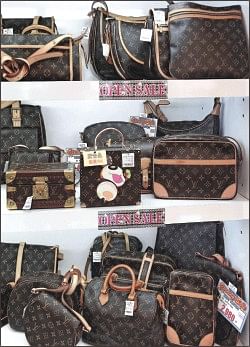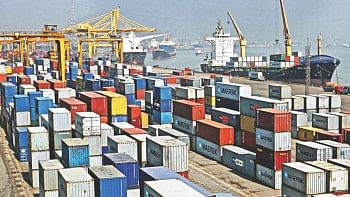Second-hand luxury goods defy slowdown

Second hand branded Louis Vuitton purses and goods are seen for sale at the second "Brand Off" shop during its opening ceremony in Hong Kong. Despite weakness of the retail market and incessant talks about the economic downturn, secondhand branded goods including authentic handbags, jewelleries and timepieces are seeing growing demand. Photo: AFP
Tsutomu Yasuyama is doing something that few retail entrepreneurs across Asia would contemplate in the current economic slowdown -- expanding.
While the shopping sector from Taiwan to Australia is suffering, the Japanese retailer has chosen the crisis to open two new branches of his chain Brand Off in his home country, and one in Hong Kong.
His apparently recession-proof business? Second-hand luxury goods.
"This is the best moment for me to expand my business empire," said Yasuyama, who runs 43 second-hand luxury goods stores in Japan.
As many of the city's top earners are suffering from pay cuts, slashed bonuses or redundancy, companies that provide value-for-money -- from fast-food joints to cheap electronics -- have been thriving.
But while Louis Vuitton has been forced to cancel plans for a new flagship store in Tokyo because of the economic situation, the demand for luxury has not gone away.
Milan Station, a Hong Kong-based second-hand luxury handbag chain, said its stores have benefited from belt-tightening, getting nearly 10 percent more customers in recent months.
"Women's desire for brand-name goods will not disappear because of the financial crisis," Tony Chan, senior manager of Milan Station, told AFP.
"The moment a woman buys her first luxury handbag, there is no return."
Chan said most of the customers who came to trade in their handbags were not bargaining as hard as they used to because they wanted, or needed, quick cash.
This allows Milan Station to acquire and sell their handbags at lower prices to attract a wider range of customers, and the savings are significant.
A second-hand, jumbo-sized "Channel 2.55" quilted flap bag cost 23,000 Hong Kong dollars now (2,950 US), compared to its first-hand price of 32,000 dollars.
In addition, in the topsy-turvy market some bags gain value second-hand as they become collectors' items.
Chan said one second-hand Hermes handbag which sold at retail for 60-70,000 HK dollars had been on sale for 90,000 dollars because of its rarity. However, the downturn has seen its second-hand price drop by 10,000.
Yasuyama, 46, said he is aiming to open 15 second-hand luxury goods shops in Hong Kong and China in the next five years, including nine in Beijing, Shanghai, and Guangzhou.
Eventually, he hopes to expand his business to Singapore, Taiwan and Macau.
Yasuyama said the crashes in the stock markets and surging unemployment rates have forced even those who are used to leading extravagant lifestyle to tighten their purse strings.
"I am receiving more new customers who used to use only first-hand goods. They want to trade in their handbags and jewellery so that they can buy new ones and save some money at the same time," he said.
And the notorious desire of Hong Kong for luxury goods is showing no sign of slowing down, Yasuyama said.
"Hong Kong people love brand-name products and care more about their appearance than even Japanese or any other nationalities I can think of," he said, adding he has also taken advantage of the struggling property market by taking prime retail locations at reduced prices.
Sundy Chen, a consumer expert at research firm TNS China, expected the luxury goods market to be severely hit by the financial crisis as well-off consumers looked for ways to trim their spending.
"Given the economic situation, luxury goods will be amongst the first expenditure they want to cut. The same will happen for the middle class consumers, who are the occasional purchasers of luxury goods," she said.
Chen said it made sense that some consumers would turn to the second-hand market, but she warned there was some social stigma attached to used goods.
"In mainland China, second-hand luxury goods is still something quite new. Face is important to the customers there, and they tend to prefer using genuine and first-hand products.”

 For all latest news, follow The Daily Star's Google News channel.
For all latest news, follow The Daily Star's Google News channel. 



Comments